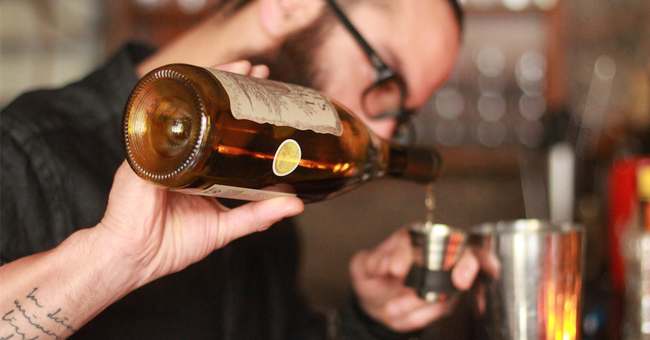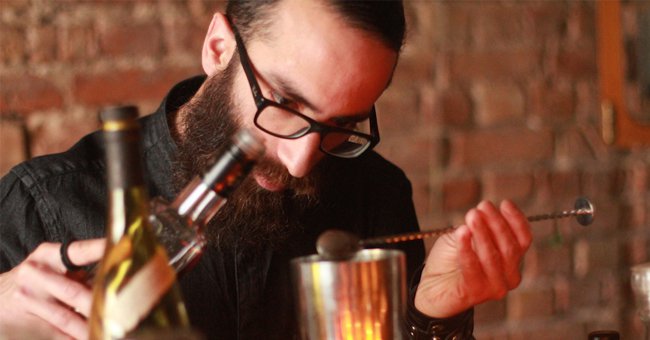Crossing the threshold of Berlin speakeasy Schwarze Traube, you’ll spot all the hallmarks of a good bar: high-quality spirits, house-made liqueurs, an array of homemade bitters. One thing, however, is notably absent: a menu. That’s thanks to owner Atalay Aktas, who feels that a standard cocktail list is more limiting than it is helpful.
Atalay’s food and beverage career spans 15 years, from working 12 hour shifts as a waiter to bartending high-volume club bars and mixing hand-crafted cocktails at popular Berlin bar Salut. It was during his time at the latter when Atalay came to realize his desire to run a no-menu bar, doing away with the restriction of a set list of offerings. His creativity was constantly pushing him to work outside the confines of the menu, no matter how lovingly the selection was put together.
“At Salut, we were always talking about how great [the menu] was, and yet it was somewhat restricted,” he says. “I never really wanted to own a bar where you have a menu, because I think you restrict people to certain flavors. In the end they choose something they already know; they’re afraid to order something new because they don’t understand the constellation of the drink, or they might not know a certain liqueur or bitter.”
Schwarze Traube recently celebrated its third anniversary, but the bar is already drawing international crowds (and lines of people waiting for a seat). To gain entry into Schwarze Traube, guests knock and wait to be let inside. Once all the seats in the bar are taken, no more guests are welcomed until a space frees up, as Atalay’s wish is that everyone inside is at ease, relaxing in a comfortable seat—not worrying about getting up and waiting at the bar to be served, or standing around without a seat once they come inside.
And, without a menu, how do you order? Bartenders might ask guests which spirits they prefer, or how simple (or complex) they like their drinks. Atalay may even ask for a childhood memory to inspire the drink that he makes. “For me, finding aromas or building up drinks through crazy combinations is a constant process. I carry it with me all the time. I get ideas while I drink, from a dream, walking around, or shopping at the supermarket,” he says. Feeding Atalay’s creativity was especially crucial to running a no-menu bar: his inspiration comes as much from food-pairings as combining flavors. The food influence weighs in from his time as a barman for Bacardi at the grand KaDaWe (Kaufhaus des Westens in Berlin, the largest department store in Europe). Atalay was given free reign of the food counters, as long as he worked the ingredients into a drink.
 In 2013, Atalay won Diageo’s German World Class Bartender of the Year—a victory that put his already-busy bar on the international map.
In 2013, Atalay won Diageo’s German World Class Bartender of the Year—a victory that put his already-busy bar on the international map.
Atalay’s first cocktail experience was a turning point of his career 15 years ago, as a waiter in a large restaurant in a popular tourist area of Berlin. Earning good tips was an attractive aspect of the job, but stepping into the bar in the back awakened his senses to the wondrous alchemy of boozy elixirs. Atalay vividly remembers the moment when the axis of his universe turned and he was offered the job as barman.
“The second I entered the bar to pick up the drink, it was like being in heaven. Perhaps it was destiny, but one of the managers chose me over all the waiters, even though I didn’t apply. Maybe she saw how much passion I had.”
In 2013, Atalay won Diageo’s German World Class Bartender of the Year, going on to win the title at the Europe-wide level, and finishing as a finalist in the global top 20. Schwarze Traube was already open at the time of his win, so what changed afterwards? “Well, the place was always busy, but the crowd became international. It put us on the international map.”
And what’s coming up next for Aktas? “We’re working on a second bar around the corner, more of a café-bar, it will open soon. And right next door, we’ll have a liquor store where we will supply customers, and ourselves, with good booze, and we’ll start to sell small batches of what we produce ourselves.” That roster of products includes infusions, homemade bitters, and liqueurs in flavors like lavender, coffee, honey, lemon, raspberry-chili and vanilla. “For all of us, this is a lab,” he says, “so everyone is working on things here, not just me.”





